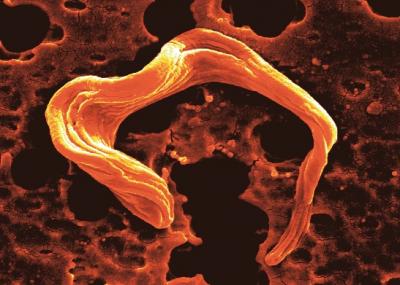
Credit: Mick Urbaniak
Lancaster University researchers have shed light on how the parasite which causes sleeping sickness multiples inside its host.
Human African Trypanosomiasis or sleeping sickness, only occurs in Sub-Saharan Africa where an estimated 60 million people in 36 countries are at risk.
According to the World Health Organisation (WHO), more than 95 percent of reported cases are caused by the parasite Trypanosoma brucei gambiense, which is found in western and central Africa. The other 10 percent of cases are caused by Trypanosoma brucei rhodesiense, which is found in eastern and southern Africa.
Both subspecies are harboured by both wild and domestic animals which provide a reservoir of infection for Tsetse flies which then bite humans.
The infection attacks the central nervous system, causing severe neurological disorders. Without treatment the disease is fatal.
Research led by Dr Mick Urbaniak with Dr Corinna Benz of Lancaster University reveals that the parasite’s cell division differs from that of humans and animals.
The paper published in PLoS Pathogens has identified many hundreds of proteins that were not previously known to be involved in the cell division cycle.
Dr Urbaniak said: “Differences in the control in cell division may be exploited to create drugs that target the parasite but do not affect the human or animal host.”
This is the first in-depth quantitative analysis of changes in the phosphoproteome that occur across the cell cycle in T. brucei. The identification of many hundred CCR phosphorylation sites confirms the importance of many known cell cycle proteins and implicates many more as having a potential role in the cell cycle.
“The data presented here will be of value to the trypanosome research community, and provides an important insight into mechanisms of post-transcriptional gene regulation that are likely to prove of relevance to the wider community as well.”
###
Media Contact
Gillian Whitworth
[email protected]
44-125-245-92612
Related Journal Article
http://dx.




